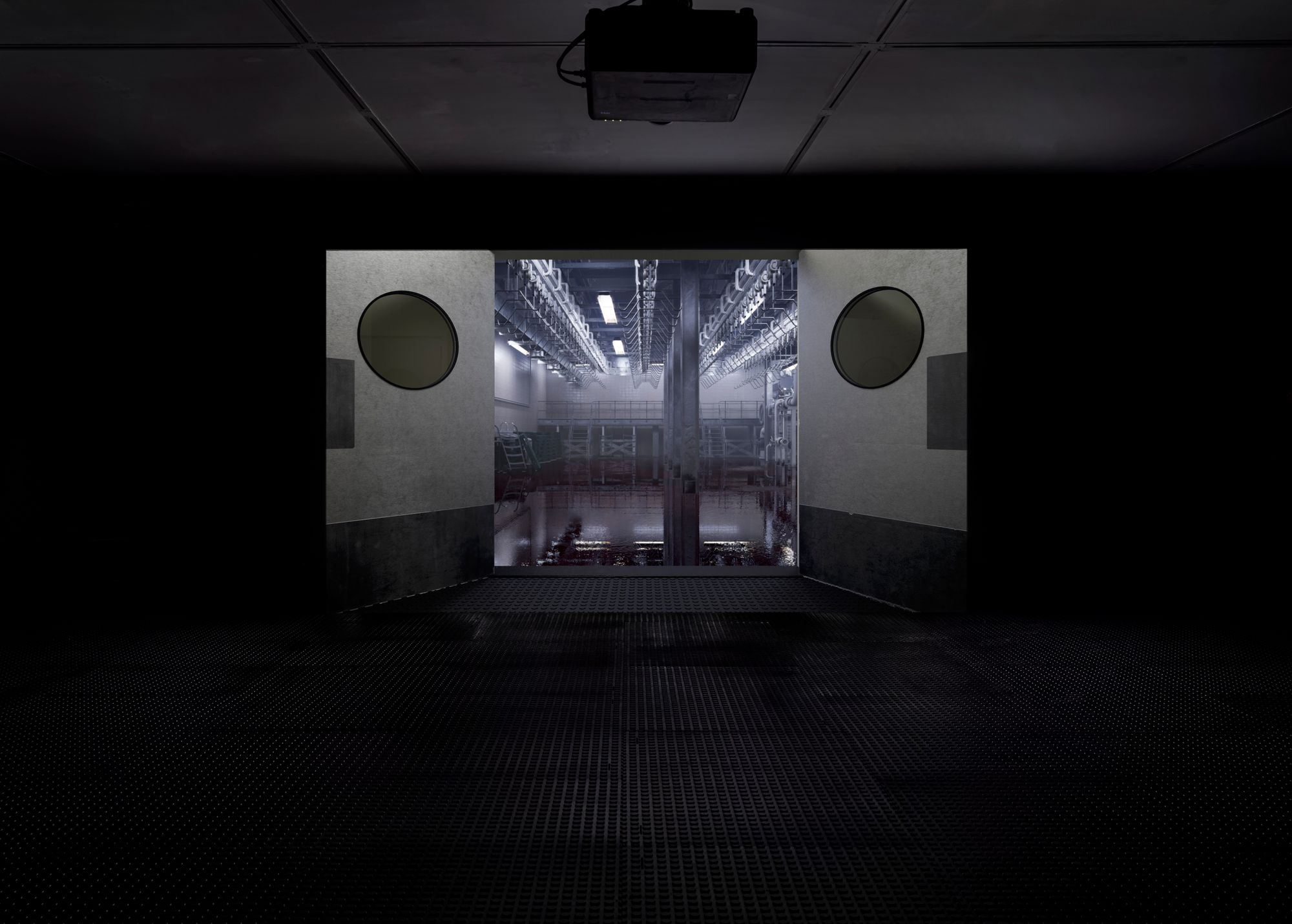
Aria Dean, Abattoir, U.S.A.!, 2023. Single-channel video, sound, colour, 10:50. Courtesy the artist and Greene Naftali, New York. Collection of The Vega Foundation. Installation view: The Power Plant Contemporary Art Gallery, Toronto, 2023. Photo: Toni Hafkenscheid.

Aria Dean, Abattoir, U.S.A.!, 2023. Single-channel video, sound, colour, 10:50. Courtesy the artist and Greene Naftali, New York. Collection of The Vega Foundation. Installation view: The Power Plant Contemporary Art Gallery, Toronto, 2023. Photo: Toni Hafkenscheid.

Aria Dean, Abattoir, U.S.A.!, 2023. Single-channel video, sound, colour, 10:50. Courtesy the artist and Greene Naftali, New York. Collection of The Vega Foundation. Installation view: The Power Plant Contemporary Art Gallery, Toronto, 2023. Photo: Toni Hafkenscheid.

Aria Dean, Abattoir, U.S.A.!, 2023. Single-channel video, sound, colour, 10:50. Courtesy the artist and Greene Naftali, New York. Collection of The Vega Foundation. Installation view: The Power Plant Contemporary Art Gallery, Toronto, 2023. Photo: Toni Hafkenscheid.

Aria Dean, Abattoir, U.S.A.!, 2023. Single-channel video, sound, colour, 10:50. Courtesy the artist and Greene Naftali, New York. Collection of The Vega Foundation. Installation view: The Power Plant Contemporary Art Gallery, Toronto, 2023. Photo: Toni Hafkenscheid.

Aria Dean, Abattoir, U.S.A.!, 2023. Single-channel video, sound, colour, 10:50. Courtesy the artist and Greene Naftali, New York. Collection of The Vega Foundation. Installation view: The Power Plant Contemporary Art Gallery, Toronto, 2023. Photo: Toni Hafkenscheid.

Aria Dean, Abattoir, U.S.A.!, 2023. Single-channel video, sound, colour, 10:50. Courtesy the artist and Greene Naftali, New York. Collection of The Vega Foundation. Installation view: The Power Plant Contemporary Art Gallery, Toronto, 2023. Photo: Toni Hafkenscheid.
13 Oct–07 Jan 2024
The Power Plant Contemporary Art Gallery
Aria Dean is an artist and writer who has created a multi-platform body of work based in trenchant critiques of representational systems. Confounding binaries such as abstraction and figuration, individual and collective, Dean’s sculptures, installations, videos, and essays trouble received ideas of race, power, and form. Concerned with what art objects can do, and have done, for their producers and receivers, Dean tracks artistic innovations against an array of theoretical positions, from poststructuralism to Afropessimism, not just to parse the social and material bases of art but also to grasp its impact on the ontology of Blackness.
In her newest film Abattoir, U.S.A.!, Dean draws on her long-term research on agricultural and industrial architecture, surveying the interior of an empty slaughterhouse. The slaughterhouse in Abattoir, U.S.A.! is animated using Unreal Engine, a 3D computer graphics tool used to create real-time environments for a wide range of platforms. The work considers the importance of these structures in the development of modernist architecture and urban design that influenced the work of a generation of European architects such as Walter Gropius and Le Corbusier. The omission of the slaughterhouse, or abattoir, from this narrative leads to questions about the relationships between modernism and death, as Dean engages with one such site and its entanglements with fundamental questions of humanity.
Dean was initially inspired by philosophers Georges Bataille and Frank Wilderson, each of whom address the slaughterhouse in their writings—whether as a metaphor or paradigm—as crucial to the constitution of civil society. Abattoir, U.S.A.! also builds on Dean’s own research into the slaughterhouse and industrial architecture, and the ways they reveal modernism’s intimacy with death on conceptual, political, and material levels. The film ruminates on this through the slaughterhouse’s presence as both an allegorical structure and a literal place where the boundary between human, animal, and machine is produced and reproduced.
Installed at The Power Plant, the work has particular potency set against the backdrop of Toronto’s industrial history along the waterfront. The Power Plant was originally constructed in 1926 as a powerhouse, to hold the heating and refrigeration equipment for the massive cold storage warehouse facility next door. Not far from The Power Plant’s location were once corporate and municipal abattoirs, which gave some truth to the city’s old nickname “hogtown” for its large-scale industrial landscape that was once common to Toronto. Taking the slaughterhouse as its subject and projecting its forms into a virtual space, Abattoir, U.S.A.! ultimately explores how meaning is produced through moving images, working across material, symbolic, and technological registers.
Crucial to these considerations is the film’s immersive eight-channel score by composer Evan Zierk, which weaves together field recordings, samples, pop melodies, and algorithmically generated sequences. Influenced by Romantic-era classical composition and Hollywood melodrama, this multidimensional score plays a vital role in developing the film’s landscape, and its experimentation with the construction and limitations of narrative.
Abattoir, U.S.A.! was commissioned by the Renaissance Society at the University of Chicago, where it was curated by Myriam Ben Salah with Karsten Lund and Michael Harrison and presented in February 2023. The film was co-produced with The Vega Foundation.
The exhibition at The Power Plant is organized and developed in partnership with The Vega Foundation, curated by The Vega Foundation Executive Director Julia Paoli and with technical consultation provided by Aamna Muzaffar.